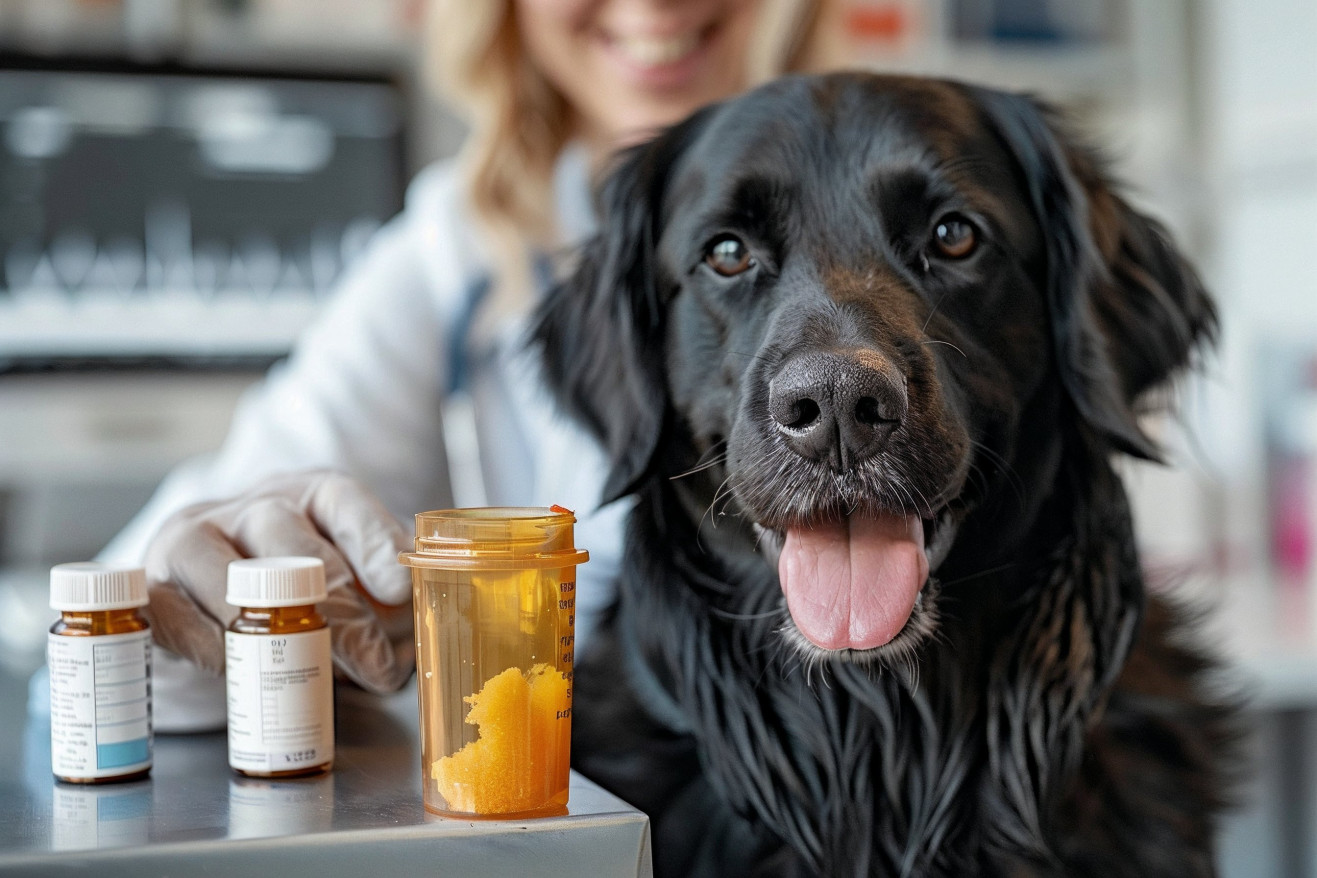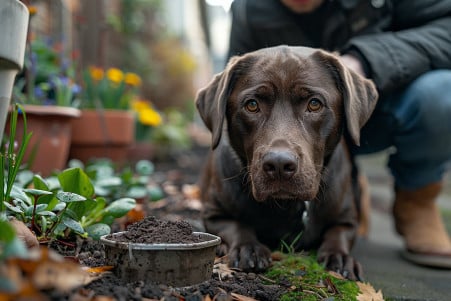Black Dog Poop But Acting Normal: What Does It Mean?
22 March 2024 • Updated 21 March 2024

If your dog is pooping black and seems to be acting normal, there are many reasons why this could be happening, from something as simple as a change in diet to more serious health issues. Black dog poop can be a sign of blood that has been digested in the gastrointestinal tract due to a variety of health issues like stomach ulcers, cancer, parasites, or even something they ate - but it can also be caused by eating bones, grass, or taking iron supplements.
In this article, we'll explore the potential reasons for black dog poop with no other symptoms, so you can better understand if it's time to take your dog to the vet or if it's probably nothing to worry about. Backed by the most recent scientific research and input from veterinarians, you'll find out what black poop might mean for your dog and when you should be concerned. Armed with this knowledge, you can determine if your dog's strange poop color is a cause for concern or not.
Is black dog poop a sign of a medical problem?
When to Be Concerned About Black Dog Poop
While black dog poop alone may not be a sign of a serious issue, there are some other symptoms that you should be aware of that would indicate that you need to take your dog to the vet immediately. According to Vet Help Direct, if your dog has black poop and is also experiencing diarrhea, vomiting, lethargy, loss of appetite, or abdominal pain, you should take them to the vet as soon as possible.
Wagwalking.com also notes that if your dog has tarry, sticky black poop that looks like coffee grounds, you should take them to the vet immediately as this is a sign of gastrointestinal bleeding. In addition, if your dog is weak, has pale gums, or is breathing rapidly, these are all signs that you should take them to the vet immediately as well, as they could be signs that your dog is losing blood or experiencing other complications.
It's important to make sure that you get a diagnosis and treatment plan as soon as possible if your dog has black poop and any of the symptoms above. As the studies mentioned earlier note, gastrointestinal bleeding from issues like ulcers or certain cancers can be fatal if they're not treated.
By making sure that you're paying attention to your dog and taking them to the vet as soon as you notice any concerning symptoms, you can make sure that they get the treatment that they need before the issue gets worse. This brings us to the potential causes.
Why Is My Dog's Poop Black? Common Causes and More
The most common reason for black dog poop is a dietary change, especially if you have recently given your dog a new food or treat that contains bone meal or iron supplements, says Great Pet Care. Black poop can also be a side effect of certain medications, including anti-inflammatory drugs and corticosteroids, according to ElleVet Sciences.
Gastrointestinal problems like stomach ulcers, inflammatory bowel disease, or intestinal tumors can cause internal bleeding that results in black, tarry poop, says Pumpkin. Parasites like hookworms and whipworms can also cause digestive tract bleeding that leads to black poop, according to the same source.
Ingestion of foreign objects or toxins can also cause bleeding and black, tarry poop due to gastrointestinal irritation, says Great Pet Care. Knowing what might be causing this worrisome symptom can help you figure out what to do next.
Diagnostic Approach: How Vets Find the Cause of Black Dog Poop
Vets will start by performing a physical exam and taking a detailed medical history when a dog comes in with black poop, according to ElleVet Sciences. Blood tests, including a complete blood count (CBC) and chemistry panel, can be used to look for evidence of internal bleeding, inflammation, or other issues, says Wagwalking.com.
A fecal exam may be ordered to look for parasites or other issues in the stool, says Dogster. X-rays or ultrasounds may be used to look for blockages, tumors, or other abnormalities in the digestive system, according to the same article.
Sometimes, more invasive diagnostic tests, such as endoscopy or exploratory surgery, are needed to find the cause and location of the bleeding, according to Dogster. By using a variety of diagnostic tests, vets can hopefully find the cause of the black poop and come up with a treatment plan.
Treatment Options: Dealing With the Underlying Cause
The treatment plan for black dog poop will vary based on the underlying cause that was determined through diagnostic tests. As noted by ElleVet Sciences, if the cause is dietary indiscretion or a side effect of medication, it may be as simple as making changes to the dog's diet or medication.
If the cause is a gastrointestinal problem like an ulcer or inflammatory bowel disease, treatment may involve medications like anti-inflammatories, acid reducers, or antibiotics, according to Dogster. Parasitic infections will require deworming medications and supportive care to treat any complications that arise, as explained by Pumpkin.
More severe causes like tumors or obstructions may require surgery or other more advanced treatments, including chemotherapy or radiation therapy, according to Dutch. However, in all cases, if the underlying cause is treated with the appropriate plan, vets can address black dog poop and get your pet's digestive system back on track.
Home Remedies and Preventative Methods for Healthy Poop
While black dog poop may need to be treated by a vet, there are also some home remedies and preventative methods that can help ensure your dog’s digestive system stays healthy. The Farmer's Dog explains that feeding your dog a high-quality, balanced diet and avoiding sudden changes in their diet can help prevent gastrointestinal upset and the issues that come with it.
Making sure your dog is well-hydrated and has access to clean, fresh water can help with digestion and poop quality, according to Pawmeal. Regular exercise and maintaining a healthy weight can also help ensure a healthy digestive system and reduce the risk of certain health problems, the same source notes.
Deworming your dog on a regular basis as recommended by your vet can help prevent parasitic infections that can lead to black stools, according to Pawmeal. Making sure to talk to your vet as soon as you notice any changes in your dog’s poop can help ensure that any issues are caught early and treated quickly, according to the American Kennel Club. By staying on top of your dog’s digestive health, you can help prevent the need for more serious medical treatment in the future.
Conclusion: When to Seek Veterinary Care for Black Dog Poop
Although black dog poop can be scary, especially if you don’t know what’s causing it, if your dog is acting normally and isn’t showing any other signs of distress, it may not be an emergency. That said, if your dog’s black poop doesn’t go away after a day or two or if it’s accompanied by diarrhea, vomiting, lethargy, or any signs of pain or discomfort, you should take your dog to the vet as soon as possible.
In addition, if your dog’s black poop is tarry, sticky, or smells bad, or if your dog is weak, has pale gums, or any other concerning symptoms, you should seek veterinary care right away. The sooner you can get your dog diagnosed and treated, the better, especially since some of the conditions that can cause black dog poop can be fatal if they’re not treated. With that in mind, make sure you’re proactive about getting your dog the care they need so that they can get back to having a healthy digestive system.


